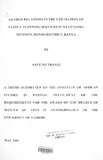| dc.description.abstract | This study attempts to examine gender relations and how they influence the utilisation of family planning services in Nyang'oma sub-location in Bondo Distict, Kenya, on the shores of Lake Victoria. To date, social scientists and policy makers interested in fertility issues have devoted almost all of their attention to women, and very little to men. The researcher is aware of the historical links of 'family planning' with 'population control' and of strong arguments for and against 'population control'. She justifies the need for 'family planning', however, on the grounds that it improves maternal health and is a positive move in the long overdue emancipation of African women.
This study, therefore, aimed to find out how women in their various situations of social relations utilise family planning services. Most important decisions in the use of family planning services are made at the household level; so the household has been the level of focus and unit of analysis.
First-hand data were obtained from focus group discussions, non-participant observations, essays, narratives, key informant interviews, and a questionnaire to 100 respondents - 20 married men, 20 married women, 20 single mothers, 20 teenage girls and 20 teenage boys. Secondary data came from documentary sources.
Analyses of these.data show that family planning services focus mainly on women when trying to disseminate information on family planning. Men, the
household decision-makers, are largely ignored - one reason for the failure of family planning programmes. The study showed that men and women do not make joint decisions on family planning issues: they leave nature to take its course. Women have no choice but to use family planning services secretly.
There is something of a taboo for most partners to discuss sexual issues; and this contributes largely to non-use of family planning services, especially by married women. The status, education level, household role, religious beliefs and martial status of women, all affect her access to, and use of, family planning services. Preferences for boys over girls, perceived ideal family size, and discussion about fertility related matters also affect the rate of use.
On the basis of these findings, it was concluded that, if family planning agencies want their services to be used more effectively, then they must not treat women in isolation, but consider them in conjunction with the real social situations in which they are embedded. It really must be 'family' planning.
It is, therefore, recommended that policy makers should design policies that show more concern for woman's social situations. More attention should be focussed on issues that help to empower women; so that they can then enhance their abilities to make independent reproductive decisions. There is also a need for more investigation of traditional methods of birth control and find out how they can be applied to the community, because male partners are more supportive of.1beir use. Also, fertility treatment and counselling should be promoted to treat barrenness and lessen its associated lifelong stigma. | en |

